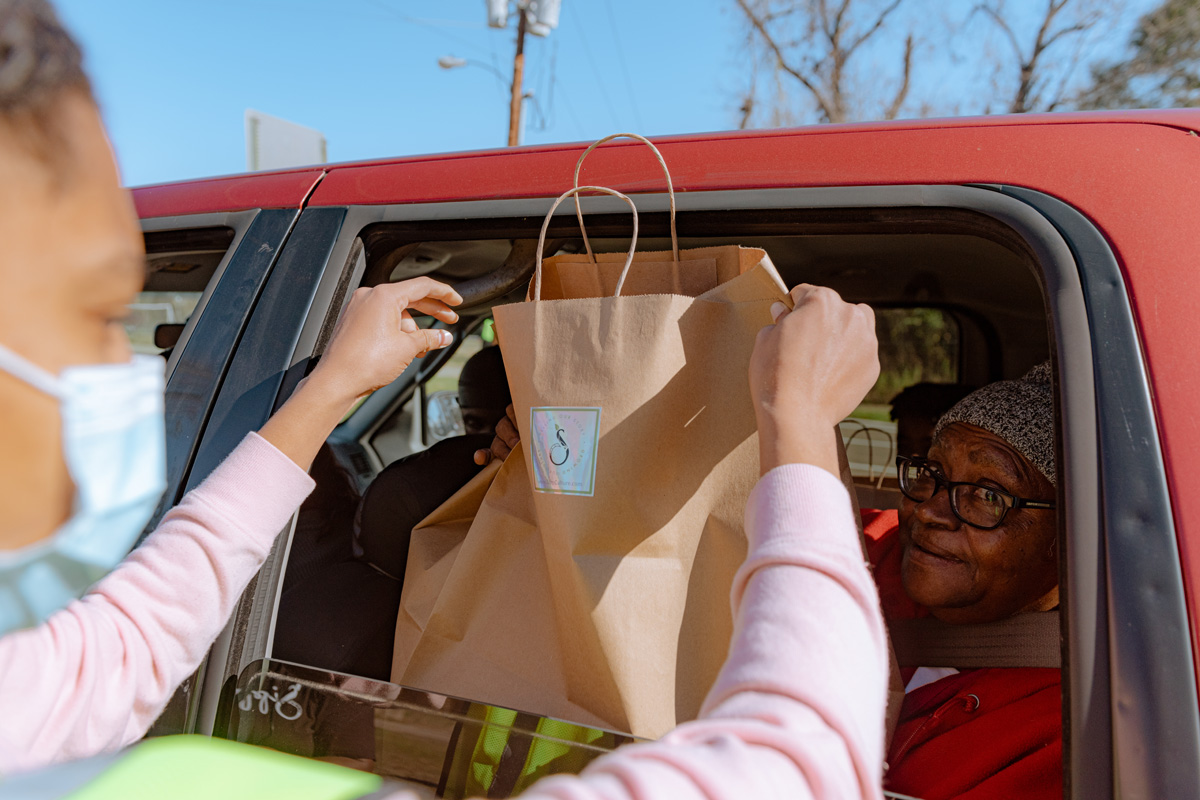Jesse Killingsworth grew up in Hazlehurst, Miss., where his mother grew all their food. She had a garden full of onions, tomatoes, potatoes, bell peppers, cucumbers, greens, corn and other produce to feed the family.
“We used to get on a bean truck and pick beans so we could make our little change. Our parents didn’t have any money to give us, so we’d miss school for one day and go pick beans all day. It was a good experience,” Killingsworth told the Mississippi Free Press.
When he moved to Utica, it was thriving, he said, with drugstores, two or three doctors and dentists. This was the late 1970s, and Utica that was hustling and bustling.
Today, it’s a different story.
Meet, Greet and Eat
Utica sits in a food desert with residents having to travel outside their community to other surrounding towns to grocery shop or get fast food. The Sunflower grocery store closed in 2014. Main Street Market, which MFP reported on in May, is closed at the moment, but is set to open in the upcoming year under new management, store owner Destenee Green told the Mississippi Free Press.
Killingsworth can’t exactly pinpoint what led to Utica’s decline in past years, but he is doing his part in helping to create solutions at Sipp Culture’s “Meet, Greet & Eat.” The event, which took place on Dec. 5 from 11 a.m. to 3 p.m., was a free no-contact community meal that allowed local residents to learn about the Sipp Culture’s “Equitable Food Futures,” a research project that seeks to address healthy food access in rural Mississippi.
During the “Meet, Greet & Eat,” residents reserved a meal for a pick-up time, then entered a parking slot at the Utica baseball field, and a community advisory member explained the project, from a safe distance, while their meals were being prepared. Simple.
The only thing the organization wants in return are food stories and possible solutions for how to bring healthy food to the community.
“Food is going to get people to mobilize and come out, and then you serve them something else. Can we call you and talk to you about these ideas and these issues? We want to hear what you have to say about these things,” Sipp Culture Director Carlton Turner told the Mississippi Free Press.
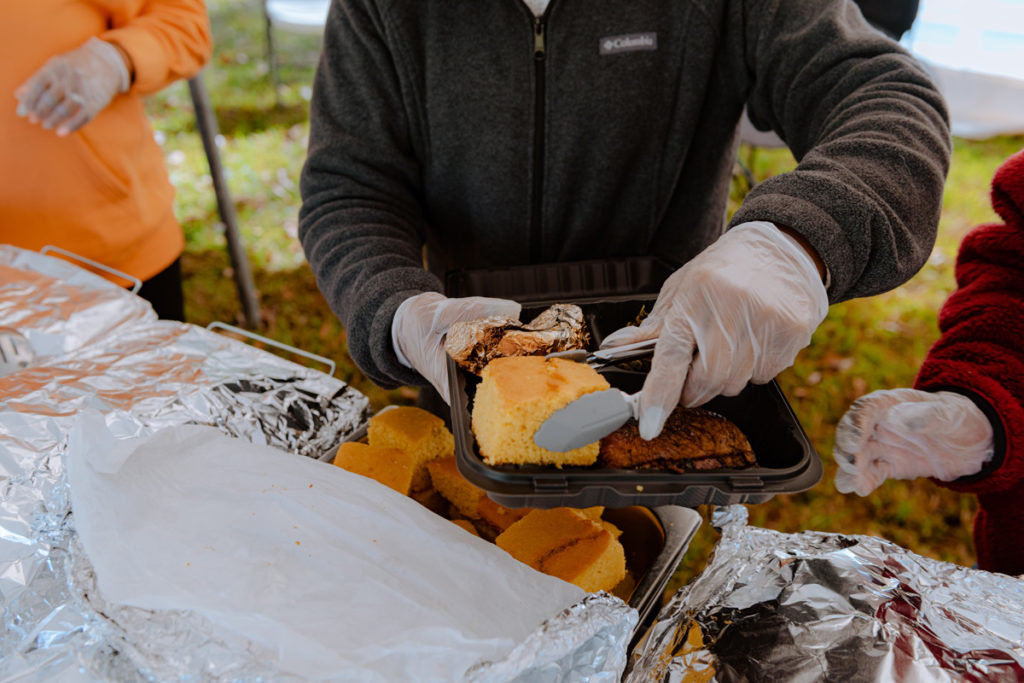
The menu on Dec. 5 consisted of chicken, collard greens, smoked sweet potatoes and cornbread, all prepared by Chef Phillip Brown. All the food was grown locally. Utica farmer Mattie B grew the collard greens, the sweet potatoes came from Jackson farmer Cindy Ayers-Elliot at Foot Print Farms, and a wholesaler in Bolton provided the chicken.
Killingsworth, a community advisory member for the initiative, spoke to resident Marth Moss at the meet and eat about the project. Moss, who has been living in Utica for 10 years, started her own garden. She was given a chicken coop in November, so she no longer has to leave her community for fresh eggs, she said.
“I hate that we don’t have anything. The only thing we have is the dollar store. Other than that, I have to go to Byram. I rarely go to Clinton, but I go to Byram or Sam’s,” Moss said.
Killingsworth suggested ideas like community gardens or possibly building a Walmart in town, which would not only bring healthy food, but jobs as well. Moss readily agreed.
“If we can’t get a Walmart, we can get a Dollar General market like they got in Crystal Springs. That’ll even work. I went and looked at Sipp Culture when I first got the card in the mail, so I’ll check it out,” Moss said.
‘Complicate the Narrative’
Sipp Culture Director Carlton Turner moved around the event, going car-to-car to discuss the “Equitable Food Futures” project and its relationship to the meet-and-eat with Utica residents. He heard many residents speak about the need for a grocery store, but he wants to push beyond that answer and complicate the narrative, he said.
“I understand the grocery store leaving as part of a long chain of events, not something that was a singular event. Like the grocery store left because they closed this high school in 1993,” he said, pointing to the dilapidated building across the street.
“Then in 2014, they closed the other high school, and then they closed the shirt factory, which was right across the street from the grocery store, which employed 100 Black women,” Turner continued.
Since women make most of the food decisions in the household, those same women who work at the shirt factory would most likely frequent the grocery store across the street for convenience. That’s guaranteed customers, the Sipp Culture director said.
“When you close the shirt factory and the high school, where you have mostly women teaching that also make the decisions about household food, bringing the grocery store back doesn’t change those things. And if you don’t think about those things, then the grocery store is just going to come and go,” he said.
Instead of thinking about the grocery store, Turner wants to think about groceries and the myriad ways they can get them to the community, he said.
“I think that is the most important conversation we could be having as a community because it’s going to lead us to a more sustainable conversation about actually fixing the problem,” Turner said.
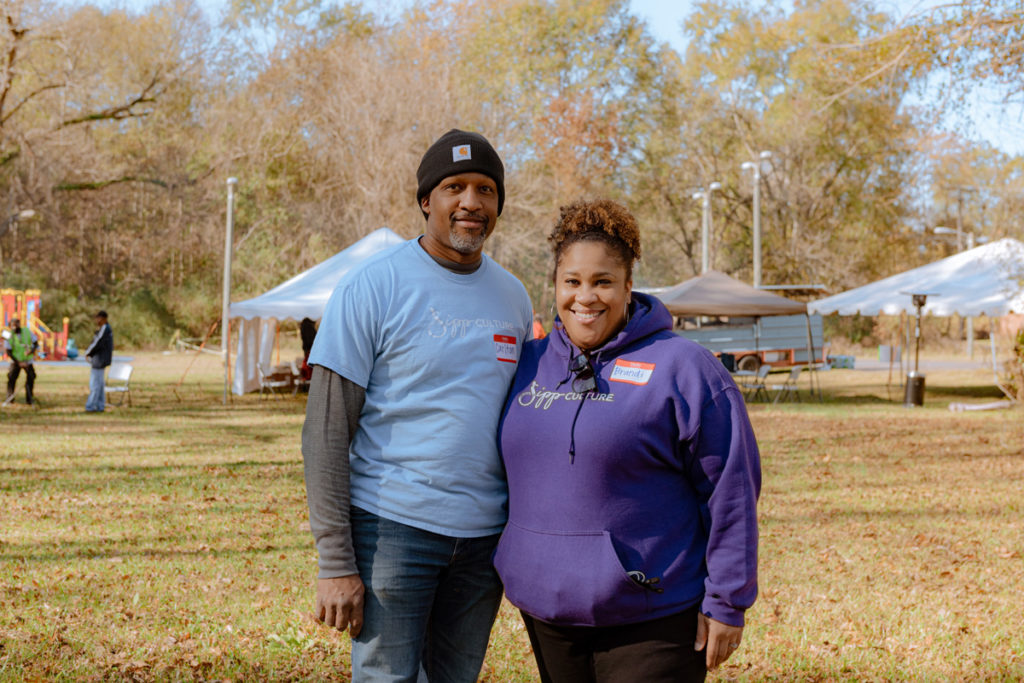
The arts organization applied for an interdisciplinary fellowship with Imagining America consortium, which funds 15 projects a year. The project is largely funded by the Robert Wood Johnson Foundation, the leading medical researcher in the country.
The work the community advisory members are doing is an effort to put stories behind the research and data, he said. The organization will be researching the usage of the land in Utica over the past 100 years, who owns what land and how the land can be used for food production for the community.
“Hopefully, what we’re doing can be extrapolated to be of use to other small rural communities in Mississippi because we’re all operating under similar power structures that are being made for our communities not by our communities,” Turner said.
Turner is making sure the work is intergenerational by having young volunteers work the event, from checking in residents who reserve meals to bringing the food to vehicles.
“Hopefully, they are learning to have some connection to their community. They’re meeting people. It’s about trying to give them an example of how community works when people are working together,” the director said.
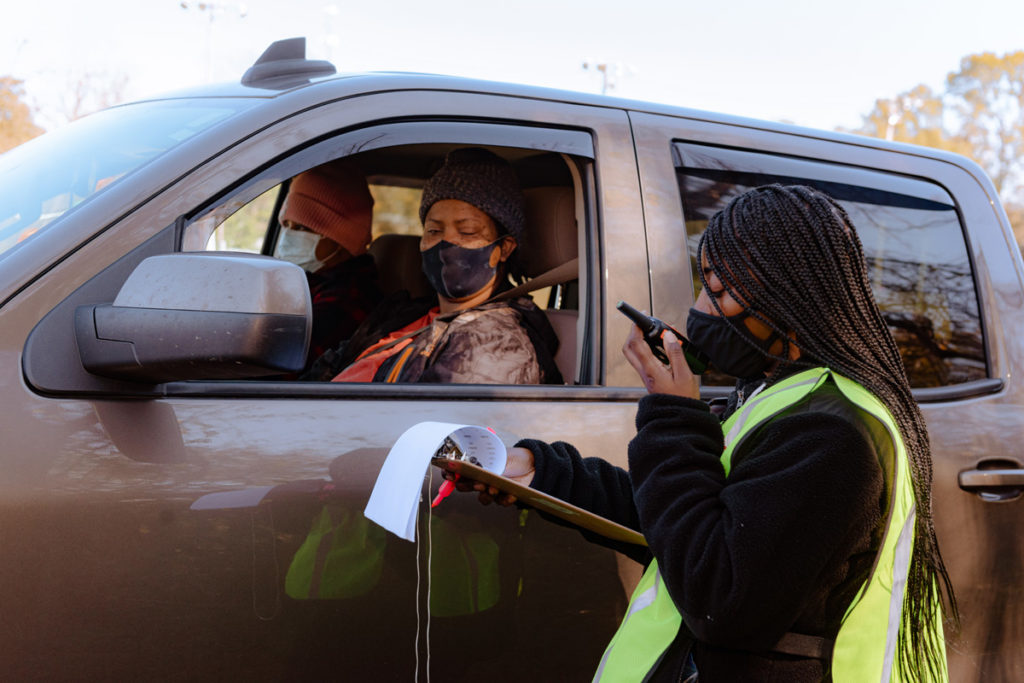
Marqua Lofton, 25, a second-year dental student at UMMC, volunteered for the Sipp Culture event with her mother and community advisory-board member Mary Lofton. Marque remembers when the last grocery store closed in 2014. Now, she and her family have to go to Vicksburg to grocery shop, which is at least 30 miles away, she said.
“It’s really a food desert. That’s why I’m glad Sipp Culture, someone from the community, is trying to give back. We have older people here too and disabled people who can’t get out and drive and it’s harder for them. It shouldn’t have to be that hard to get quality food at home when everyone else can do the same,” she said.
Mary Lofton has lived in Utica for more than 50 years and jumped at the opportunity to be a part of the project and help find ways to bring healthy food to the community. One year, she had to shop for herself and her brother, who is disabled, and it took her hours to grocery shop as she moved from Raymond, Jackson and Clinton, she said.
“We have to look at healthier food, and that’s what we need. Fast food is not good for the family, for anybody. As a Black woman, our health is important, and we don’t have the right means of eating,” Lofton said.
‘Food Defines Us’
Farmer and Agriculturist Karla Turner-Bailey, Carlton’s sister, is one of the more fortunate residents in Utica as she is able to grow her own food. It’s somewhat of a family tradition as her grandparents owned a farm and her mother, who was also a chef, grew her on food.
“Some of my best stories are being able to take our deer, venison and fry fresh tenderloin,” Turner-Bailey said. “That’s one of my favorites. It’s one of those things where you began to realize the importance of food, but the heart and love that goes into preparing it and what it does for you as a person.”
Despite having a farmer, having no grocery store still puts a strain on them when it comes to acquiring staples like sugar and flour.
“I want to make sure my community has it, so whenever we have extra fresh fruit and vegetables from our farm, we make sure we provide it to those in need and who want it. We sell eggs on a daily basis, so hopefully, in time, we’ll be able to share more of our fresh items we have on our farm,” Turner-Bailey said.
As an agriculturalist, she feels like the state is using its resources properly, but they are missing the point when it comes to equity and equality. Large-scale farmers reap more of the benefits from the government, and the majority of those farmers are not people of color. Mississippi also exports a ton of food outside the state when there are communities in-state that need it, she added.
“We don’t have a lot of vegetable production on a small scale that would benefit our local individuals. That’s why I want more people to be self reliant and independent when it comes to being able to grow their own food and the importance of taking care of yourself. When you know how to grow your own food, you’ll never be hungry,” Turner-Bailey said.
She believes the younger generation and middle-age residents are disconnected from the process of taking something from a seed and growing it to put on their plate, she said. Ultimately, she wants to teach residents how to grow their own food, and she hopes more people of color will take that on, she said.
“I remember last growing season we had a dinner where everything that was on our plate was grown on our farm, from the chicken we were eating to the greens to the sweet potatoes. So it’s a beautiful thing to be able to grow your own food,” she said.
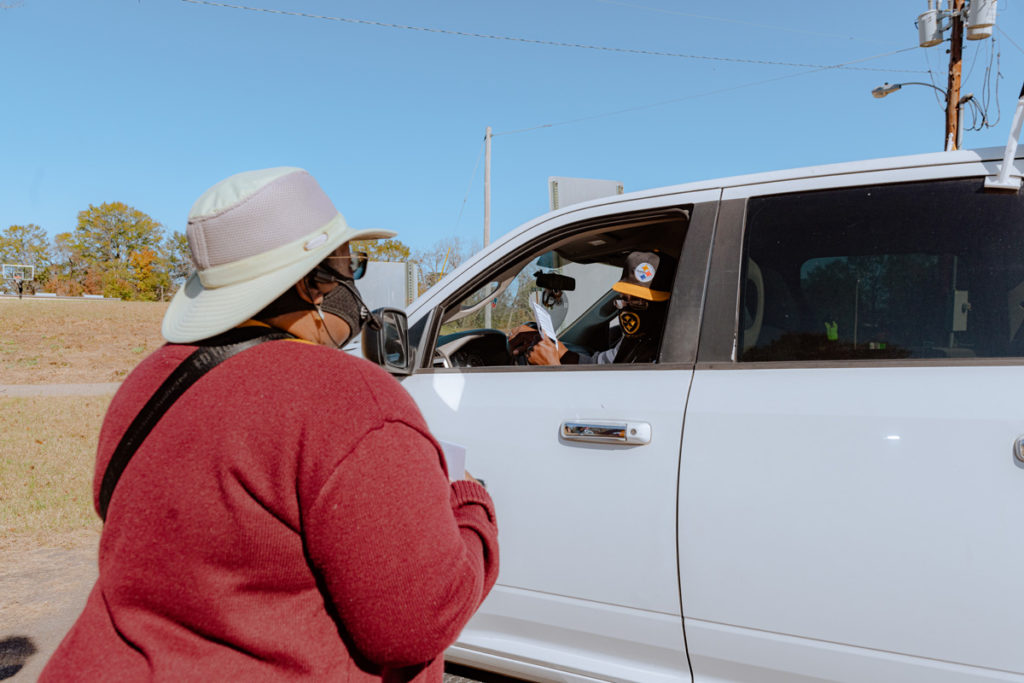
Community advisory member Jean Green, who has been living in Utica for 20 years, said there are stories in every dish that you make. Her relationship with cornbread and biscuits is an interesting one in that she can’t cook them. She learned to make cornbread from her grandmother, standing by her side to watch what ingredients to include and so on.
“I poured the stuff in there, but it didn’t rise high enough,” she said. “My grandmother told me I stood here with you, and I saw you put the stuff in there. What did you do? I said I did what you told me.”
Her grandmother makes cornbread that’s thick and looks like cake, and her homemade biscuits are round and fluffy. Green said food is like your heritage, where you pass down what your grandmother learned from her grandmother and so forth.
“All of our stories center around what we ingest. Food defines us as a people and a region because of the connection to the food that we have. It’s sort of what connects us to our history,” she said.
CORRECTION: Sipp Culture applied with Imagining America to the Robert Wood Johnson Foundation’s Interdisciplinary Research Fellowship program.

